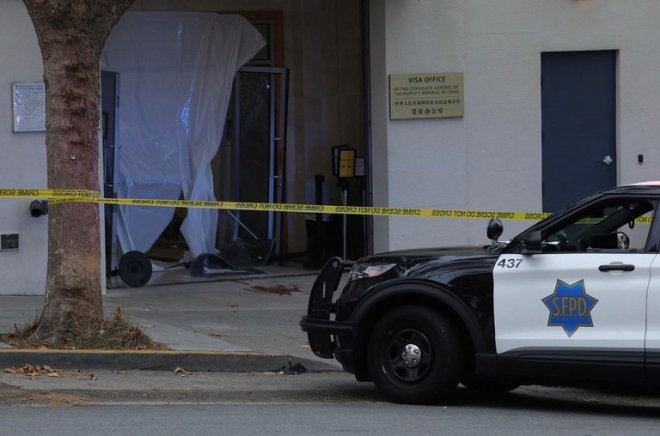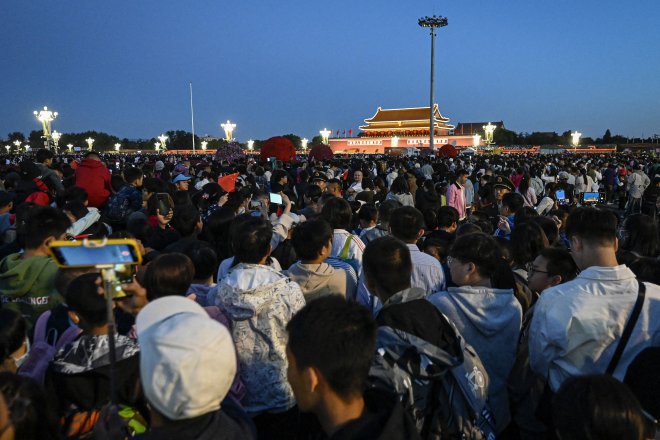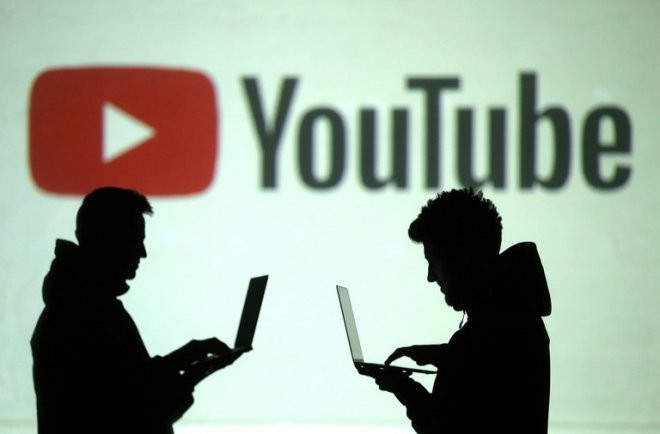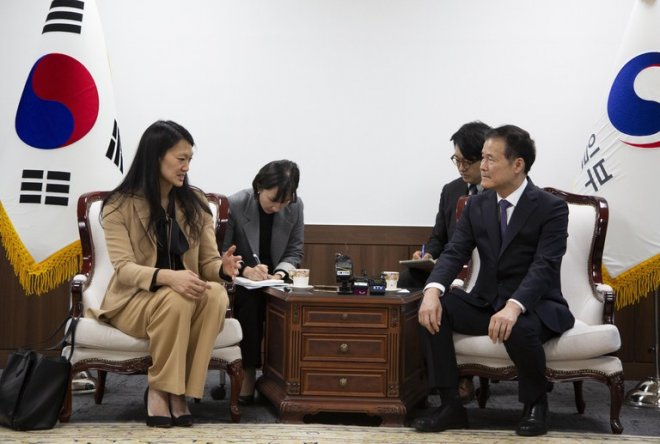US intel chief: Agencies ‘divided’ over COVID origins
The U.S. intelligence community is “divided” over whether COVID-19 originated from a lab in Wuhan or from natural exposure to an infected animal, and is only sure it wasn’t a deliberate bioweapon, Director of National Intelligence Avril Haines told the Senate on Wednesday.
Asked by Sen. Susan Collins, a Republican from Maine, why she would not say categorically that COVID-19 leaked from a Chinese virology lab, Haines said the intelligence community “remains divided on this issue,” with different agencies offering different analyses.
“Basically, there"s a broad consensus in the intelligence community that the outbreak is not the result of a bioweapon or genetic engineering,” Haines said. “What there isn"t a consensus on is whether or not it"s a lab leak, essentially ... or natural exposure to an infected animal.”
“We"ve been trying to collect additional information,” she explained. “China has not fully cooperated, and we do think that"s a key critical gap. That would help us to understand what exactly happened.”
Haines was appearing before a hearing of the Senate Intelligence Committee – alongside the directors of the Central Intelligence Agency, Federal Bureau of Investigation, National Security Agency and Defense Intelligence Agency – to answer questions relating to the intelligence community’s latest annual worldwide threat assessment report.
FBI Director Christopher Wray told the committee his agency believed the so-called “lab-leak theory” was accurate. “The FBI has long said, going all the way back to the summer of 2021, that the origin of the pandemic was likely a lab incident in Wuhan,” Wray said.
![]() FBI Director Christopher Wray testifies during a Senate Intelligence Committee hearing on worldwide threats, in Washington, D.C., on Wednesday, March 8, 2023. (AFP)
FBI Director Christopher Wray testifies during a Senate Intelligence Committee hearing on worldwide threats, in Washington, D.C., on Wednesday, March 8, 2023. (AFP)
But Haines stressed that was not a universal view, with analysts “trying to do the best that they can to figure out what exactly happened.”
“The Department of Energy has changed its view slightly, with low confidence: It says that a lab leak is most likely, but they do so for different reasons than the FBI does, and their assessments are not identical,” she said. “So you can see how challenging this has been.”
TikTok threat
Senate Intelligence Committee Chair Mark Warner, a Democrat from Virginia, on Tuesday had announced a new bipartisan bill that would give the Biden administration the authority to ban TikTok, the popular Chinese-owned social media platform, across the United States.
The bill, which has bipartisan support in the Senate and has also been backed by the White House, would allow the secretary of commerce to ban any foreign-owned technology deemed a national security threat.
![]() U.S. Sen. Mark Warner (D-Va.), chairman, and Marco Rubio (R-Fla.), vice chairman, listen to testimony during a Senate Intelligence Committee hearing on "worldwide threats," on Capitol Hill in Washington, D.C., on Wednesday, March 8, 2023. (Reuters)
U.S. Sen. Mark Warner (D-Va.), chairman, and Marco Rubio (R-Fla.), vice chairman, listen to testimony during a Senate Intelligence Committee hearing on "worldwide threats," on Capitol Hill in Washington, D.C., on Wednesday, March 8, 2023. (Reuters)
None of the intelligence chiefs were asked if they supported the bill, but each said TikTok created an intelligence threat for the United States.
“In terms of our national security, it obviously enables our adversaries’ efforts at espionage,” CIA Director William Burns said. “It enables them to steal intellectual property, it enables them to get access to sensitive technologies, it enables them to spy on our citizens as well. So it offers enormous opportunities, I think, for our adversaries.”
Wray said that TikTok’s threat stemmed from the inability of its Beijing-based parent company, ByteDance, to refuse to follow orders from the Chinese Communist Party given China’s authoritarian system.
“The difference between an ostensibly private company and the CCP is essentially a distinction without a difference,” Wray said. “So if you were to ask Americans, ‘Would you like to turn over all your data, control of your devices, control of your information to the CCP?’ Most Americans would say ‘I"m not down with that,’ as my kids would say.”
Sen. Marco Rubio, a Florida Republican and the vice-chair of the committee, said that he believed the failure of Congress so far to ban TikTok came down to the fact that “we"ve forgotten what it"s like to live in a world where we have near-peer competitors” like China.
“The commentary class, think tanks, academia, to some extent even Congress, is still filled with officials who came of age in the post-Cold War fantasy about the end of history,” Rubio said, also blaming business for becoming reliant on off-shoring. “We’ve become a society addicted to cheap products from China, and viral videos on TikTok.”
He asked Wray whether TikTok could be used for propaganda.
“Could they use it to drive narratives, like to divide Americans against each other – for example, let"s say China wants to invade Taiwan – to make sure Americans are seeing videos arguing why Taiwan belongs to China [and] why the U.S. should not intervene?” Rubio asked.
“Yes,” Wray responded, adding: “We"re not sure that we would see many of the outward signs of it happening if it was happening.”
U.S.-China relations
Before shutting its doors for a closed hearing, the committee did not ask about a number of other claims made in the threat assessment report released by the intelligence committee on Wednesday.
The report notably said that North Korea’s cyber program could “cause temporary, limited disruptions of some critical infrastructure” in the United States, and that the situation in Myanmar is heading toward a stalemate with neither side able to achieve military superiority.
![]() From left, Federal Bureau of Investigation Director Christopher Wray, National Security Agency Director Paul Nakasone, Director of National Intelligence Avril Haines, Central Intelligence Agency Director William Burns and Defense Intelligence Agency Director Scott Berrier testify before a Senate Intelligence Committee hearing on "worldwide threats," on Capitol Hill in Washington, D.C., on Wednesday, March 8, 2023. (Reuters)
From left, Federal Bureau of Investigation Director Christopher Wray, National Security Agency Director Paul Nakasone, Director of National Intelligence Avril Haines, Central Intelligence Agency Director William Burns and Defense Intelligence Agency Director Scott Berrier testify before a Senate Intelligence Committee hearing on "worldwide threats," on Capitol Hill in Washington, D.C., on Wednesday, March 8, 2023. (Reuters)
Instead, the meeting focussed mainly on the threat posed by China, which has become one of few areas of bipartisanship in Congress.
Haines, the national intelligence director, told the hearing Beijing would likely soon seek a calming of tensions to allow China to get its house further in order, while outwardly “signaling opposition” to Washington.
“We assess that Beijing still believes it benefits most by preventing a spiraling of tensions, and by preserving stability in its relationship with the United States,” she said, explaining that Chinese President Xi Jinping seeks “a period of relative calm to give China the time and stability it needs to address growing domestic difficulties.”
“Beijing wants to preserve stability in East Asia,” she said, even as it adopts “an increasingly aggressive approach” to the world.
[圖擷取自網路,如有疑問請私訊]
Asked by Sen. Susan Collins, a Republican from Maine, why she would not say categorically that COVID-19 leaked from a Chinese virology lab, Haines said the intelligence community “remains divided on this issue,” with different agencies offering different analyses.
“Basically, there"s a broad consensus in the intelligence community that the outbreak is not the result of a bioweapon or genetic engineering,” Haines said. “What there isn"t a consensus on is whether or not it"s a lab leak, essentially ... or natural exposure to an infected animal.”
“We"ve been trying to collect additional information,” she explained. “China has not fully cooperated, and we do think that"s a key critical gap. That would help us to understand what exactly happened.”
Haines was appearing before a hearing of the Senate Intelligence Committee – alongside the directors of the Central Intelligence Agency, Federal Bureau of Investigation, National Security Agency and Defense Intelligence Agency – to answer questions relating to the intelligence community’s latest annual worldwide threat assessment report.
FBI Director Christopher Wray told the committee his agency believed the so-called “lab-leak theory” was accurate. “The FBI has long said, going all the way back to the summer of 2021, that the origin of the pandemic was likely a lab incident in Wuhan,” Wray said.
 FBI Director Christopher Wray testifies during a Senate Intelligence Committee hearing on worldwide threats, in Washington, D.C., on Wednesday, March 8, 2023. (AFP)
FBI Director Christopher Wray testifies during a Senate Intelligence Committee hearing on worldwide threats, in Washington, D.C., on Wednesday, March 8, 2023. (AFP)But Haines stressed that was not a universal view, with analysts “trying to do the best that they can to figure out what exactly happened.”
“The Department of Energy has changed its view slightly, with low confidence: It says that a lab leak is most likely, but they do so for different reasons than the FBI does, and their assessments are not identical,” she said. “So you can see how challenging this has been.”
TikTok threat
Senate Intelligence Committee Chair Mark Warner, a Democrat from Virginia, on Tuesday had announced a new bipartisan bill that would give the Biden administration the authority to ban TikTok, the popular Chinese-owned social media platform, across the United States.
The bill, which has bipartisan support in the Senate and has also been backed by the White House, would allow the secretary of commerce to ban any foreign-owned technology deemed a national security threat.
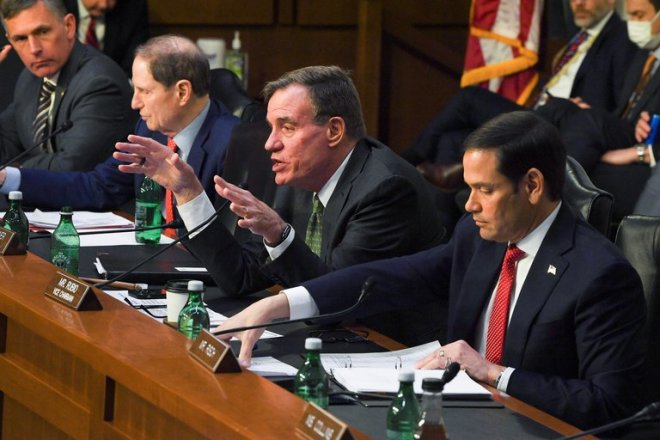 U.S. Sen. Mark Warner (D-Va.), chairman, and Marco Rubio (R-Fla.), vice chairman, listen to testimony during a Senate Intelligence Committee hearing on "worldwide threats," on Capitol Hill in Washington, D.C., on Wednesday, March 8, 2023. (Reuters)
U.S. Sen. Mark Warner (D-Va.), chairman, and Marco Rubio (R-Fla.), vice chairman, listen to testimony during a Senate Intelligence Committee hearing on "worldwide threats," on Capitol Hill in Washington, D.C., on Wednesday, March 8, 2023. (Reuters)None of the intelligence chiefs were asked if they supported the bill, but each said TikTok created an intelligence threat for the United States.
“In terms of our national security, it obviously enables our adversaries’ efforts at espionage,” CIA Director William Burns said. “It enables them to steal intellectual property, it enables them to get access to sensitive technologies, it enables them to spy on our citizens as well. So it offers enormous opportunities, I think, for our adversaries.”
Wray said that TikTok’s threat stemmed from the inability of its Beijing-based parent company, ByteDance, to refuse to follow orders from the Chinese Communist Party given China’s authoritarian system.
“The difference between an ostensibly private company and the CCP is essentially a distinction without a difference,” Wray said. “So if you were to ask Americans, ‘Would you like to turn over all your data, control of your devices, control of your information to the CCP?’ Most Americans would say ‘I"m not down with that,’ as my kids would say.”
Sen. Marco Rubio, a Florida Republican and the vice-chair of the committee, said that he believed the failure of Congress so far to ban TikTok came down to the fact that “we"ve forgotten what it"s like to live in a world where we have near-peer competitors” like China.
“The commentary class, think tanks, academia, to some extent even Congress, is still filled with officials who came of age in the post-Cold War fantasy about the end of history,” Rubio said, also blaming business for becoming reliant on off-shoring. “We’ve become a society addicted to cheap products from China, and viral videos on TikTok.”
He asked Wray whether TikTok could be used for propaganda.
“Could they use it to drive narratives, like to divide Americans against each other – for example, let"s say China wants to invade Taiwan – to make sure Americans are seeing videos arguing why Taiwan belongs to China [and] why the U.S. should not intervene?” Rubio asked.
“Yes,” Wray responded, adding: “We"re not sure that we would see many of the outward signs of it happening if it was happening.”
U.S.-China relations
Before shutting its doors for a closed hearing, the committee did not ask about a number of other claims made in the threat assessment report released by the intelligence committee on Wednesday.
The report notably said that North Korea’s cyber program could “cause temporary, limited disruptions of some critical infrastructure” in the United States, and that the situation in Myanmar is heading toward a stalemate with neither side able to achieve military superiority.
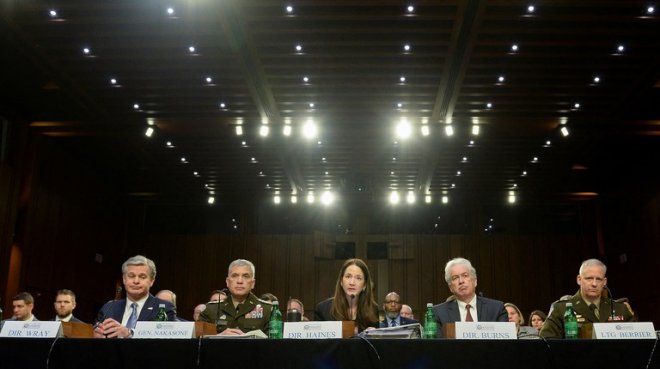 From left, Federal Bureau of Investigation Director Christopher Wray, National Security Agency Director Paul Nakasone, Director of National Intelligence Avril Haines, Central Intelligence Agency Director William Burns and Defense Intelligence Agency Director Scott Berrier testify before a Senate Intelligence Committee hearing on "worldwide threats," on Capitol Hill in Washington, D.C., on Wednesday, March 8, 2023. (Reuters)
From left, Federal Bureau of Investigation Director Christopher Wray, National Security Agency Director Paul Nakasone, Director of National Intelligence Avril Haines, Central Intelligence Agency Director William Burns and Defense Intelligence Agency Director Scott Berrier testify before a Senate Intelligence Committee hearing on "worldwide threats," on Capitol Hill in Washington, D.C., on Wednesday, March 8, 2023. (Reuters)Instead, the meeting focussed mainly on the threat posed by China, which has become one of few areas of bipartisanship in Congress.
Haines, the national intelligence director, told the hearing Beijing would likely soon seek a calming of tensions to allow China to get its house further in order, while outwardly “signaling opposition” to Washington.
“We assess that Beijing still believes it benefits most by preventing a spiraling of tensions, and by preserving stability in its relationship with the United States,” she said, explaining that Chinese President Xi Jinping seeks “a period of relative calm to give China the time and stability it needs to address growing domestic difficulties.”
“Beijing wants to preserve stability in East Asia,” she said, even as it adopts “an increasingly aggressive approach” to the world.
[圖擷取自網路,如有疑問請私訊]
|
本篇 |
不想錯過? 請追蹤FB專頁! |
| 喜歡這篇嗎?快分享吧! |
相關文章
AsianNewsCast









